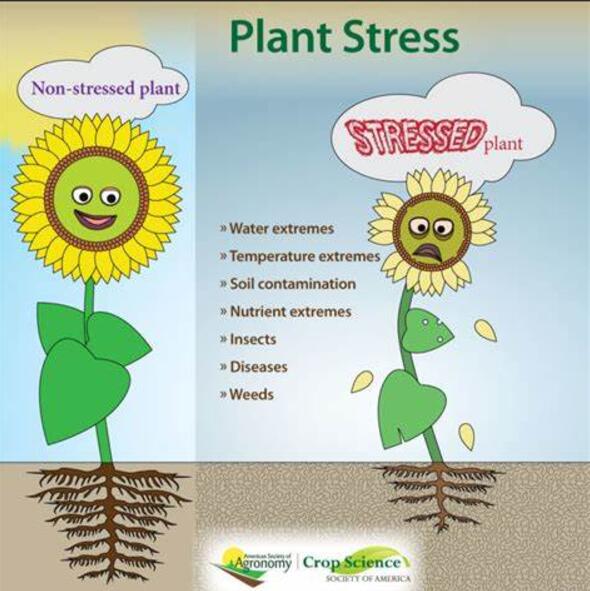mmdh2介导的羟脯氨酸积累调节拟南芥缺铁胁迫反应
IF 6.8
Q1 PLANT SCIENCES
引用次数: 0
摘要
铁(Fe)缺乏是植物生长的重要制约因素,特别是在铁生物可利用性有限的碱性土壤中。在这项研究中,我们证明了线粒体苹果酸脱氢酶MMDH2在拟南芥对铁缺乏的反应中起着至关重要的作用。mmdh2突变体对缺铁胁迫表现出敏感性,而过表达mmdh2的细胞系对缺铁胁迫表现出更强的耐受性。这种耐受性的增加与铁含量升高、ROS积累减少和NAS4转录水平升高有关。值得注意的是,在缺铁胁迫下,羟脯氨酸(HYP)的积累在野生型植物中被显著诱导,而在mmdh2突变体中没有观察到。外源补充HYP恢复了缺铁胁迫下mmdh2敏感表型,表明HYP是调节缺铁反应的信号分子。此外,我们发现bHLH转录因子ILR3直接与MMDH2启动子结合,并在缺铁条件下激活其转录,从而建立了ILR3-MMDH2调控模块。这项研究将MMDH2定位为一个中心枢纽,整合维持铁稳态所必需的代谢和转录途径。这些发现为研究植物在铁有效度有限的环境下的胁迫反应和提高作物耐受性的潜在策略提供了新的见解。本文章由计算机程序翻译,如有差异,请以英文原文为准。
MMDH2-mediated hydroxyproline accumulation regulates iron-deficiency stress response in Arabidopsis
Iron (Fe) deficiency represents a significant constraint on plant growth, particularly in alkaline soils where Fe bioavailability is limited. In this study, we demonstrate that mitochondrial malate dehydrogenase MMDH2 acts vitally in the response of Arabidopsis to Fe deficiency. mmdh2 mutants displayed sensitivity to the stress of Fe deficiency, while MMDH2-overexpressing lines displayed enhanced tolerance to this stress. This increased tolerance is associated with elevated Fe content, decreased accumulation of ROS, and raised transcription level of NAS4. Remarkably, the accumulation of hydroxyproline (HYP) was dramatically induced in wild-type plants under stress of Fe deficiency but was not observed in mmdh2 mutants. Exogenous supplementation with HYP restored the mmdh2-sensitive phenotype under Fe deficiency stress, suggesting that HYP is a signaling molecule that modulates the Fe deficiency response. Furthermore, we revealed that the bHLH transcription factor ILR3 binds directly to the MMDH2 promoter and activates its transcription under conditions of Fe deficiency, thereby establishing an ILR3-MMDH2 regulatory module. This study positions MMDH2 as a central hub integrating metabolic and transcriptional pathways essential for maintaining Fe homeostasis. These findings provide new insights into plant stress responses and potential strategies for enhancing crop tolerance in environments characterized by limited Fe availability.
求助全文
通过发布文献求助,成功后即可免费获取论文全文。
去求助
来源期刊

Plant Stress
PLANT SCIENCES-
CiteScore
5.20
自引率
8.00%
发文量
76
审稿时长
63 days
期刊介绍:
The journal Plant Stress deals with plant (or other photoautotrophs, such as algae, cyanobacteria and lichens) responses to abiotic and biotic stress factors that can result in limited growth and productivity. Such responses can be analyzed and described at a physiological, biochemical and molecular level. Experimental approaches/technologies aiming to improve growth and productivity with a potential for downstream validation under stress conditions will also be considered. Both fundamental and applied research manuscripts are welcome, provided that clear mechanistic hypotheses are made and descriptive approaches are avoided. In addition, high-quality review articles will also be considered, provided they follow a critical approach and stimulate thought for future research avenues.
Plant Stress welcomes high-quality manuscripts related (but not limited) to interactions between plants and:
Lack of water (drought) and excess (flooding),
Salinity stress,
Elevated temperature and/or low temperature (chilling and freezing),
Hypoxia and/or anoxia,
Mineral nutrient excess and/or deficiency,
Heavy metals and/or metalloids,
Plant priming (chemical, biological, physiological, nanomaterial, biostimulant) approaches for improved stress protection,
Viral, phytoplasma, bacterial and fungal plant-pathogen interactions.
The journal welcomes basic and applied research articles, as well as review articles and short communications. All submitted manuscripts will be subject to a thorough peer-reviewing process.
 求助内容:
求助内容: 应助结果提醒方式:
应助结果提醒方式:


